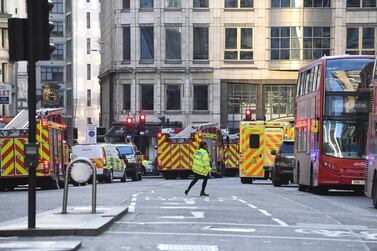Despite the bomb being fake, police have called a knife attack on London Bridge that left two dead a terrorist incident.
While the incident was significantly less deadly than the last attack on the bridge, a co-ordinated attack 2017 that left eight dead, the scenes of panic in central London, roads choked with emergency vehicles and a huge security cordon around the famous site were reminiscent.
This most recent attack provokes memories of 2017 when London was the backdrop to five major terror incidents.
It is little over two years since the last attack on London Bridge itself when a van ploughed into pedestrians on the major thoroughfare.
Assistant Commissioner of Specialist Operations Neil Basu has confirmed that the #LondonBridge incident has been declared a terrorist incident.
— Counter Terrorism Policing UK (@TerrorismPolice) November 29, 2019
Please continue to follow @metpoliceuk for further updates. https://t.co/gSNH8sl2Yv
Its driver and two passengers exited at nearby Borough Market and lunged at the patrons of restaurants and pubs with their knives. The attackers killed eight and injured 48 more before they were shot dead by police.
In the aftermath of the attack, ISIS claimed a “detachment” of its fighters had carried out the murders.
Some surprise in Whitehall that an attacker should choose #LondonBridge AGAIN 2 yrs after it was scene of terrible attack of 2017.
— Frank Gardner (@FrankRGardner) November 29, 2019
Britain remains at a “substantial” threat level, meaning a terror attack is likely.
However, the most recent incident hits London just days before it hosts the leaders of the Western world at a Nato summit and in the midst of an election that will redefine its relationship with Europe and the rest of the world.
Beginning on December 3, Nato heads of state and government, including US President Donald Trump, will visit Britain to celebrate the treaty organisation’s 70th birthday.
Friday's attack shows, once again, that unsophisticated terror plots can strike at the heart of the Western alliance’s capitals.
The incident also comes at a time when Britain is uncertain about its security future outside of the EU following a likely Brexit in 2020. Western leaders have hailed the territorial defeat of ISIS in the Levant. But the group has shown its ability to inspire independent people and groups to carry out attacks on the West repeatedly.
After the killing of ISIS leader Abu Bakr Al Baghdadi during a US special forces raid in Syria on October 29, intelligence agencies and experts warned of retribution from the group seeking revenge. While experts pointed out that the majority of ISIS victims would be civilians in countries like Iraq and Syria where the group still has a substantial network of cells and resources, attacks in the West were not ruled out.
However, it is still too early to say if Friday’s London Bridge incident was inspired by ISIS let alone whether it was directed or assisted by the group’s core command. ISIS has, so far, remained silent.
In some cases, such as the Paris attacks in 2015, operatives trained and battle-hardened within ISIS territory were responsible for the group’s atrocities. Elsewhere, like in America's San Bernardino, attackers swore their allegiance to the group beforehand.
But the 2017 attack on London Bridge showed that radical terrorists, acting without ISIS’s central control or knowledge, could deal death in the group’s name.
Now, though the centre has been destroyed, ISIS’s ideology and the threat to Western capitals remains potent.






